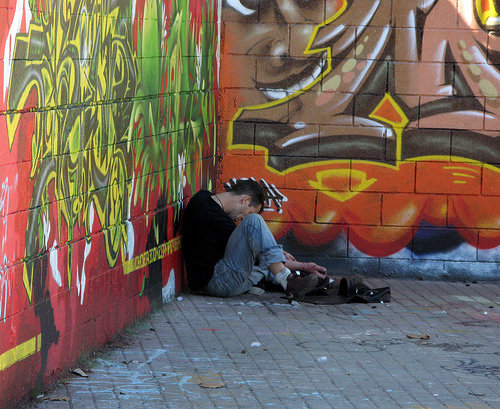Drug abuse in Russia may become a full-fledged crime resulting in a custodial sentence. The appropriate amendments to the Сriminal Code will soon be submitted for consideration by parliament.
The only way for drug addicts to avoid jail will be by agreeing to undergo a course of rehabilitation.
Greater responsibility
According to Russian legislation, illicit drug usage is currently punishable by a fine of 4,000 rubles to 5,000 rubles ($173) or an administrative arrest of up to 15 days.
The Federal Drug Control Service (FSKN), which has drafted the bill, is calling for stiffer punishment.
According to the draft, drug addicts may face up to two years imprisonment or forced labor if they refuse to undergo mandatory treatment and rehabilitation.
FSKN head Viktor Ivanov believes the penalties for drug use prescribed by the current legislation do not work. The fines are less than what it costs to buy drugs.
At the same time Ivanov believes what is important is not the term of imprisonment but the conviction itself.
“If drug use in Russia is criminalized, the number of drug users in the country will drop by 50% to 65% in the next couple of years with a corresponding fall of 50% in the number of drug-related crimes,” he said.
Legislators lend their support
Ernest Valeyev, member of the lower house of parliament (the State Duma), says that drug addicts were held criminally responsible in the past, but the practice did not catch on because it was generally thought that drug addicts are sick and sick people should not be punished.
“But if we want to control drug trafficking, we have to punish both the dealers and the users,” the MP believes.
Senator Anatoly Lyskov thinks drug trafficking offences should be nipped in the bud as soon as someone starts developing a drug habit. “Once they become addicted, they will start getting other people involved,” Lyskov says.
Senator Valery Shnyakin is also backing the bill. He says that there has been a sharp increase in the trafficking of opium poppy from Afghanistan in some Russian regions, especially Central Russia. “In view of such favorable conditions for drug addiction, the punishment for drug abuse must be tightened up,” the senator said.
Legal experts uncertain
On the other hand, some well-known Russian legal experts who were questioned by the Russian Legal Information Agency believe that the measures are too repressive and may criminalize society, with punishment being meted out to people who are ill rather than criminals.
At the same time, some experts think the provision in the bill for mandatory treatment of drug addicts is a timely and progressive measure, which may contribute to solving the drug problem.
Lawyer Vladimir Zherebenkov believes FSKN is pulling the wool over people’s eyes because it cannot show any real results.
Lawyer Yevgeny Chernousov, in turn, points out that statistically only 10% of drug addicts who are willing to undergo treatment are able to return to normal life.
He emphasized that there are no cases on record of people overcoming their drug addiction against their will.
Drug addiction is a social issue and can only be addressed with preventive methods, the lawyer believes.
Lawyer Nina Yeremenko thinks people who use drugs are in no position to decide on treatment themselves and need state support. “Their families, faced with such a tragedy, fall into debt and, even though they are aware of the problem, they cannot pay for clinical treatment, which is effective but costly,” she said.
Bill far from ideal
Some experts believe the bill needs some fine-tuning.
Yevgeny Bryun, Health Ministry top specialist, draws attention to the fact that the bill introduces the concept of the “systematic use of drugs.”
He believes that from a scientific point of view this is completely wrong. The only thing that is systematic about it is the negative effects that drugs have on health.
The expert believes that it is necessary to set out precisely who can decide whether a person is using drugs systematically, and on what grounds they can make that decision.
Lawyer Yelena Lukyanova says the bill should first be publicly scrutinized and discussed. Under current legal practices, the adoption of such a law could become an additional tool for settling personal scores, she believes.



